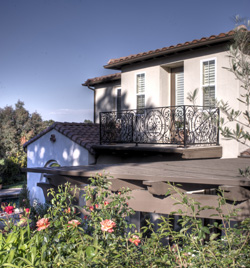YOUR HOME - RIGHT AT HOME
Feel Right at Home
September, 2010 - Issue #71
 photography by Ted Dayton |
A home equity account allows you to borrow against the value of your home, less the balance on your mortgage. By using the equity you've built, you can finance large expenses, cover education costs, make home improvements, consolidate debt - even pursue a dream. Your home equity account may allow you to...
Save money.
The interest paid on your equity account could be tax deductible (consult a tax advisor).
Lower your monthly payments.
If you have credit cards and/or other types of personal loans, paying off outstanding balances with your home equity account can potentially reduce your payments through a lower rate and interest-only payment option.
If you decide to apply for a home equity line of credit, read the credit agreement carefully and examine the terms and conditions of various plans, including the Annual Percentage Rate ("APR") and the costs establishing the plan. The APR for a home equity line is based on the interest rate alone and will not reflect the closing costs and other fees and charges, so you'll need to compare these costs, as well as the APRs, among lenders.
You can pick up a Home Equity Accounts booklet at any branch of Union Bank for more information; Canyon Country (424-9686); Newhall (799-8529); Stevenson Ranch (254-0015); Valencia (799-8531)
Take Control of your Energy Bills with Solar
Solar energy panels have improved dramatically in the last 10 years. Combining solar technology with higher-efficiency HVAC equipment by Carrier provides the ultimate solution to rising utility costs.
Solar power is a clean, reliable and cost-effective energy solution. When sun falls on solar panels it generates electricity. There are no moving parts to maintain or wear out, so the panels will work for decades. The inverter makes the solar electricity suitable for use in your home or business, or on the grid. You will not need to change your wiring or appliances. Your meter will keep track of how much power you use and how much your solar panel returns to the grid. Your utility company then bills you only for the net amount. There are state and local rebates where applicable (see www.dsireusa.org). Federal income tax credits may apply for up to 30 percent of the installed cost of a new solar photovoltaic panel system. GW Richardson Heating and Air Conditioning Inc.'s Solar Electricity division can find the right solution for homeowners or businesses that want to reduce utility bills; 295-0115
Be Prepared for Wildfire Season
Create the state-suggested 100-foot defensible perimeter around your home.
According to the California Department of Forestry and Fire Protection, do this by creating a "lean, clean and green zone" by removing all flammable vegetation within 30 feet immediately surrounding your home, and then creating a "reduced fuel zone" in the remaining 70 feet or to your property line.
If your roofing materials are flammable, replace it.
Clean your gutters and roof of debris. Trim back over-hanging dead branches near your roof and keep all branches more than 10 feet from the chimney.
Test your smoke detectors to make sure they are working properly and take the opportunity to replace the backup battery.
According to the National Fire Protection Association, three out of four deaths in fires occur from smoke inhalation. Early warning is critical to saving lives.
Be prepared.
Maintain at least a three-day supply of water and food that does not require refrigeration or cooking. Keep a list of valuables to take with you in an emergency; if possible, store them together. Establish a family phone tree and way to contact each other if separated.
Tips courtesy of American Craftsman, experts in smoke & fire restoration services; 295-5176
The Future of Flat Roofing: Single Ply
by Tommy Scherer
Until now, the most common method of covering a flat roof has been with hot tar. This method has many drawbacks. It's limited to only 15 years or so of life, it's dangerous to work with and it is complicated to install.
Single ply roofing is tar's superior replacement. It's like a big, thick rubber sheet covering your roof, lasting 40 or more years. It's highly reflective, reducing energy costs. It withstands water pooling and chemicals, and it's safe to install.
Single ply (often called TPO or PVC) roofing is basically large rolls of different combinations of rubber and plastic. The material is heat welded to create a watertight system. The best news: Single ply is now price competitive with hot tar, and in some cases even less expensive.
Tommy Scherer is the owner of T & G Roofing; 299-6750
|
||||||||||||||||||||||||||||





